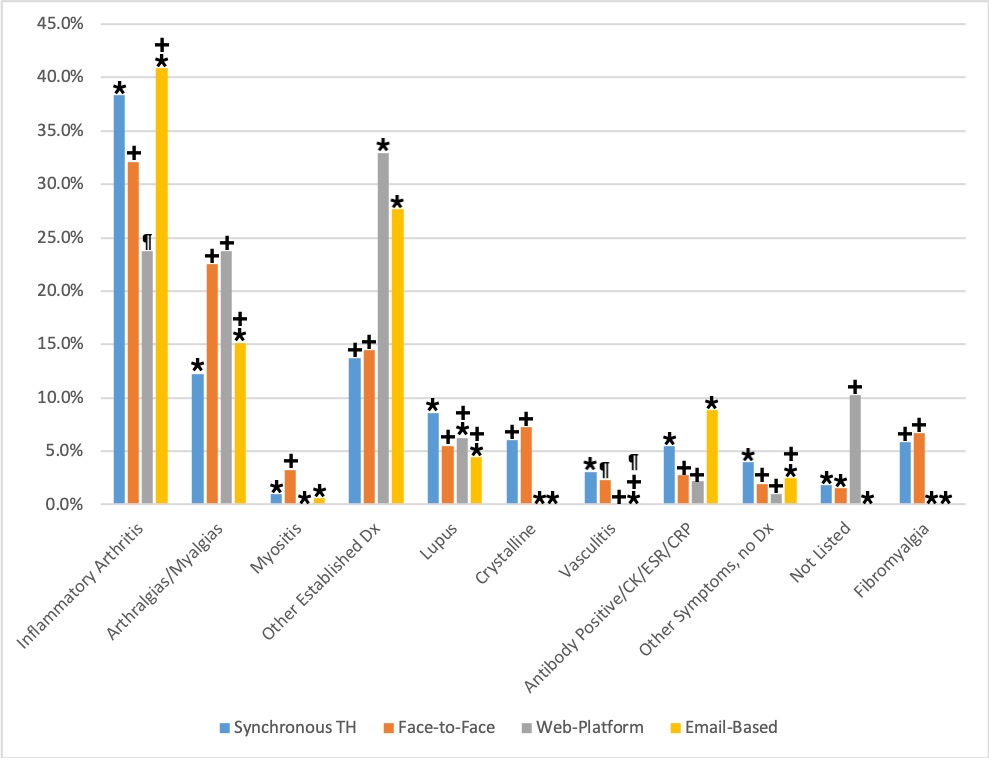Session Information
Date: Monday, November 8, 2021
Title: Health Services Research Poster II: Care Models and Innovation (1061–1082)
Session Type: Poster Session C
Session Time: 8:30AM-10:30AM
Background/Purpose: Rheumatic diseases are often diagnostically challenging not only due to rarity, but also because symptoms can develop piecemeal before the diagnosis is clear. Access to care is another hurdle. By 2025 the majority of the US population will have only 0.5-1 rheumatologist per 100,000 people despite an aging population, resulting in an estimated shortage of 3,269 rheumatologists and increasing to a shortage of 4,133 by 2030. Practice in the military health system (MHS) adds additional challenges—transitions of care and practice in austere environments. Multiple telehealth modalities have been implemented to mitigate these challenges.
Methods: We conducted a retrospective review comparing face-to-face consults during 2019 with telehealth consults from three virtual systems in the MHS: an asynchronous email-based system from May 2006 to Feb 2018, a web-based platform from 2014 to 2018, and synchronous telehealth consults from March 2020 to March 2021. We review the diagnosis resulting from consultation and if face-to-face follow up or medical evacuation was required.
Results: Leading diagnoses across platforms were inflammatory arthritis, noninflammatory arthritis, and a composite of other diagnoses. Inflammatory arthritis was the leading diagnosis for the email-based model (65 cases, 40.9%), synchronous telehealth model (429 cases, 38.4%), and face-to-face consultations (1416 cases, 32.0%). Chi-square testing revealed that inflammatory arthritis comprised significantly more consults in the synchronous telehealth and email-based models than in the web-based and face-to-face models. The composite of other diagnoses was the leading diagnosis for the asynchronous web-based model (164 cases, 32.9%), which did not differ proportionately from the asynchronous email model and was significantly more than the synchronous telehealth and face-to-face systems.
Considering outcomes, in the email-based model consultation resulted in medical evacuation in 15.7% of cases and prevented 5 unnecessary evacuations. In the web-based model, consultation prompted medical evacuation in 20.1% of cases. In the synchronous model, face-to-face follow up was recommended in 15.0% of cases.
Conclusion: Modality of rheumatology consultation influences the type of cases are seen. In the asynchronous models, there were fewer referrals for crystalline arthropathies, fibromyalgia, vasculitis, and composite of other diagnoses, suggesting a qualitative difference in referral patterns in different telehealth mediums. Despite these differences, both synchronous and asynchronous telerheumatology models were able to answer consult questions without referral for face-to-face evaluation in 79.9-85.0% of cases, suggesting teleconsultation is a viable method to increase access to high-quality rheumatology care.
 Proportion of diagnosis across consultation platforms. Matching symbols indicate that proportions are not statistically different across platforms; different symbols indicate a statistically significant difference.
Proportion of diagnosis across consultation platforms. Matching symbols indicate that proportions are not statistically different across platforms; different symbols indicate a statistically significant difference.
To cite this abstract in AMA style:
Loncharich M, DeSena D, Collamer A, Edison J. Comparing Consultation Patterns Across Telehealth Platforms and Face-to-Face Clinic in the Military Health System [abstract]. Arthritis Rheumatol. 2021; 73 (suppl 9). https://acrabstracts.org/abstract/comparing-consultation-patterns-across-telehealth-platforms-and-face-to-face-clinic-in-the-military-health-system/. Accessed .« Back to ACR Convergence 2021
ACR Meeting Abstracts - https://acrabstracts.org/abstract/comparing-consultation-patterns-across-telehealth-platforms-and-face-to-face-clinic-in-the-military-health-system/
